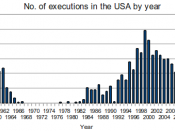� PAGE �12�
Laurentian University
Capital Punishment: Essay 4
ENG 1705EL
Zakk Bartsch
March 26 2008
Zakk Bartsch
Dr. Helena Debevc-Moroz
English 1705EL
March 31st, 2008
Lethal Punishment
The death penalty, also known as capital punishment, is known as a primitive form of punishment, the deliberate execution of a criminal by the state for crimes committed against individuals and/or the state itself. Summary execution has been a part of human history for centuries as a way to deal with murderers, spies, those who commit treason, and those who commit blasphemy, just to name but a few of the instances where it is thought justified to take someone's life. A taboo subject for some, the death penalty has become a key subject in debate as to whether a person or persons have the freedom and right to play God in deciding if someone is to live or die. The death penalty violates the right to life and as such has no place in a modern judicial system.
Fortunately, it has been a dying practice as of late and the figures, according to Amnesty International are as follows:
135 countries have abolished the death penalty in law or practice.
62 countries retain and use the death penalty, most often as a punishment for people convicted of murder.
At least 1,591 people were known to be executed in 25 countries during 2006. The true figure is certainly higher.
91 per cent of all known executions in 2006 took place in China, Iran, Pakistan, Iraq, Sudan and the USA. �
Taking someone's life for any crime is not justifiable. The fear of death and losing one's life may seem to be the greatest retribution; however such a system is primitive and barbaric. It is a biased, usually racist and at times costs the...


